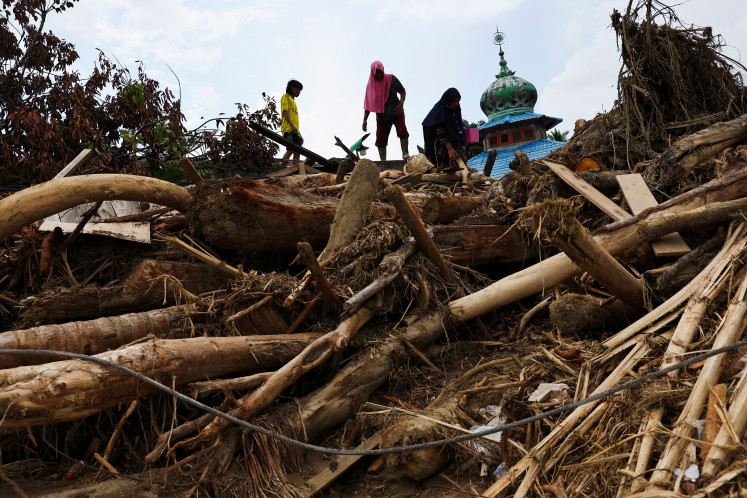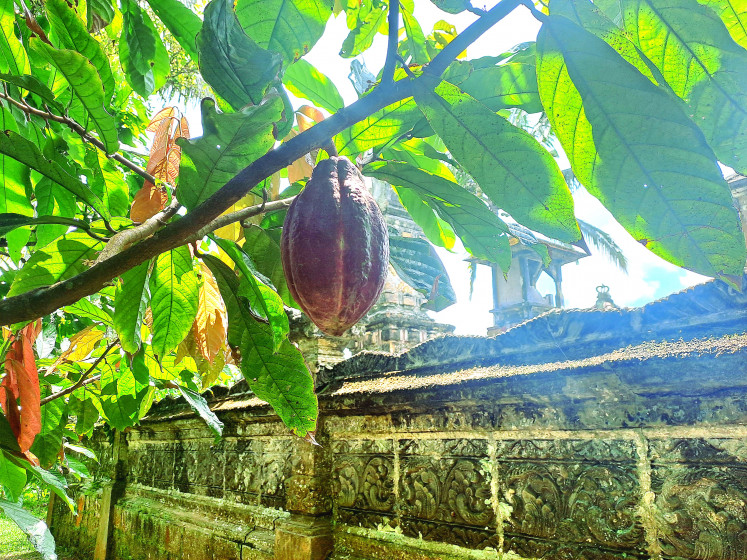Popular Reads
Top Results
Can't find what you're looking for?
View all search resultsPopular Reads
Top Results
Can't find what you're looking for?
View all search resultsIndonesia banks expected to enter Philippines next year
New partnership: Financial Services Authority (OJK) chairman Muliaman Hadad (right) shakes hands with Bangko Sentral ng Pilipinas Governor Amando M
Change text size
Gift Premium Articles
to Anyone
N
span class="caption">New partnership: Financial Services Authority (OJK) chairman Muliaman Hadad (right) shakes hands with Bangko Sentral ng Pilipinas Governor Amando M. Tetangco after signing a letter of intent in Jakarta on Sunday. (JP/Wendra Ajistyatama)
A newly discussed bilateral agreement between Indonesia and the Philippines is expected to pave the way for local banks to set up a presence in the neighboring country as soon as next year.
The Financial Services Authority (OJK) started Sunday’s negotiations with the Philippine central bank Banko Sentral ng Pilipinas (BSP) on the bilateral agreement that will promote the expansion of banks from both countries in a reciprocal manner.
Indonesia hopes to conclude the talks by the end of this year as it aims to seize the momentum of an expanding relationship with the Philippines, particularly between North Sulawesi and bordering areas in the southern part of its close neighbor, according to OJK chairman Muliaman D. Hadad.
“We’ll try to accelerate the negotiations because we want to soon grab opportunities and benefits from economic cooperation between the two countries,” Muliaman told reporters after the signing of a Letter of Intent (LoI) between the two financial institutions, which formally kicked of the negotiations.
The bilateral agreement is part of the ASEAN Banking Integration Framework (ABIF) that aims to smoothen the flow of banking and financial services by 2020 in line with the establishment of the AEC.
The framework provides ease for those described as “indigenous banks”, namely banks based in ASEAN countries, owned by ASEAN citizens and that have acquired ASEAN Qualified Bank (AQB) status, to run operations in the group’s members countries and receive similar treatment to domestic banks.
The newly started talks will touch on the technical issues regarding each country’s bank-licensing procedures, capital requirements, terms for opening branches and payment systems.
Indonesia signed a similar agreement with Malaysia last year and is in talks with Thailand on a deal.
Muliaman further said that Indonesia viewed the ASEAN Economic Community (AEC) as providing it with big economic opportunities to tap into.
“Investment and trade between ASEAN countries are very important. Therefore, the increase in investment and trade must be facilitated with the presence of financial institutions, especially banks,” he added.
Indonesia’s trade with the Philippines, a country with a population of around 100 million people, has followed an upward trend in the past five years.
Two-way trade rose by 6.4 percent on average each year from 2012 to reach US$6.09 billion last year, according to data from the Trade Ministry.
Indonesia’s exports surged by 7.58 percent on average annually to $5.27 billion over the same period, while imports declined by 0.75 percent to $821,806 million.
BSP governor Amando M. Tetangco expected that Indonesia’s qualified banks could gain footholds in the Philippines and benefit through its prevailing rule that allowed the operation of fully owned foreign banks.
Furthermore, he hoped that the bilateral agreement would boost cooperation between Indonesia and the Philippines, most notably in trade and investment.
“There are a number of Philippines companies now operating in Indonesia in various areas, including manpower consultancy, energy, research and development, and infrastructure,” Tetangco said. “These are commercial operations that we expect to expand in the future and I believe the presence of Philippine banks in Indonesia and vice versa will help further expand economic relations in terms of trade and investment.”
As the Philippines was developing its Islamic banking, it also aimed to learn from Indonesia’s experience through increased cooperation, Tetangco added.
Among Indonesian banks that plan to apply for AQB status in the Philippines is state-owned lender Bank Mandiri, which will form a joint venture with a local bank.
Muliaman said that the lender had already communicated with its Philippine counterpart, although the plan was still unofficial.
Another interested bank is state-owned lender Bank Rakyat Indonesia (BRI).
BRI director Suprajarto said it was conducting a feasibility study on opening working units in the Philippines and also expansion in other Southeast Asian countries.
“The study includes financial and non-financial aspects, modes of entry, whether in the form of overseas branches, subsidiaries, an acquisition scheme or joint venture,” Suprajarto said in a text message Saturday. (yon)










